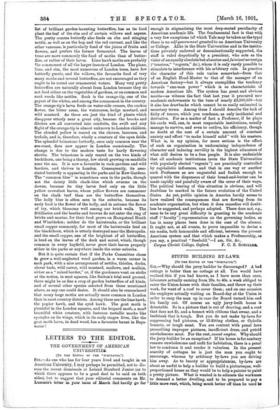LETTERS TO THE EDITOR.
THE GOVERNMENT OF AMERICAN UNIVERSITIES.
(To THE EDITOR OF TEE 'SPECTATOR']
SIE,—As one who has for four years lived and taught in an American University, I may perhaps be permitted, not to dis- cuss the recent dismissals at Leland Stanford Junior (as to which there appears to be a good deal to be said on both sides), but to suggest that your editorial comments PA Mr. Lummia's letter in your issue of March 2nd hardly go far
enough in stigmatising the most deep-seated peculiarity of American academic life. The fundamental fact is that with a very few exceptions (of which Yale may be taken as the type) there is no self-government granted to an American University or College. Alike in the State Universities and in the institu- tions privately endowed or denominationally supported, the staff is ruled despotically by a. president, who acts as the vizier of an equally absolute but absentee and fainéant sovereign ("trustees," "regents," Ste.), whom it is only rarely possible to stimulate to interference with his arbitrary rule. In practice the character of this rule varies somewhat—from that of an English Head-Master to that of the manager of an American factory—but it always exemplifies the tendency towards "one-man power" which is so characteristic of modern American life. The system has great and obvious merits—as witness the fact that last year it procured new academic endowments to the tune of nearly R3,500,000—but it also has drawbacks which cannot be so easily estimated in monetary terms. Among these I should describe the lack of fixity of tenure, which you condemn, as only incidental and derivative. For as a matter of fact a Professor, if he plays his cards well, can, in most respectable institutions, usually manage to survive, and even to outlive, his efficiency, though no doubt at the cost of a certain amount of constant anxiety and effort "to make himself solid" with his masters. What is, in my opinion, far more serious is the effect of such an organisation in undermining independence of character and inducing servility in the highest educators of what still desires to be a free people. It is also undeniable that all academic institutions (even the State Universities with popularly elected " regents ") are practically controlled by capitalistic influences, and that in one way or another such Professors. as are ungrateful and foolish enough to quarrel with the dispensers of their bread-and-butter can be made rapidly and painfully aware of the error of their ways. The political bearing of this situation is obvious, and will doubtless be marked in the future evolution of the United States. As yet, public opinion in America hardly seems to have realised the consequences that are flowing from its academic organisation, but when it does remedies will doubt- less be suggested, and perhaps adopted. There does not, e.g., seem to be any great difficulty in granting to the academic staff (" faculty "). representation on the governing bodies, as has in many places been done in the case of the a/umni. It ought not, at all events, to prove impossible to devise a via media, both honourable and efficient, between the present American system and that which makes a Professorship, as you say, a practical " freehold."—I am, Sir, Ite., Corpus Christi College, Oxford. F. C. S. SCHILLX3.






































 Previous page
Previous page